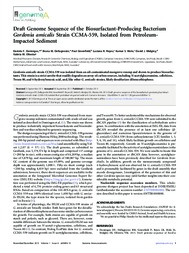Draft genome sequence of the biosurfactant-producing bacterium Gordonia amicalis strain CCMA-559, isolated from petroleum-impacted sediment.
Draft genome sequence of the biosurfactant-producing bacterium Gordonia amicalis strain CCMA-559, isolated from petroleum-impacted sediment.
Author(s): DOMINGOS, D. F.; DELLAGNEZZE, B. M.; GREENFIELD, P.; REYES, L. R.; MELO, I. S. de; MIDGLEY, D. J.; OLIVEIRA, V. C. de
Summary: Gordonia amicalis strain CCMA-559 was isolated from an oil-contaminated mangrove swamp and shown to produce biosurfactants. This strain is a strict aerobe that readily degrades an array of carbon sources, including N-acetylglucosamine, cellobiose, Tween 80, and 4-hydroxybenzoic acid, and, like other G. amicalis strains, likely desulfurizes dibenzothiophene.
Publication year: 2013
Types of publication: Journal article
Unit: Embrapa Environment
Keywords: Gordonia amicalis
Observation
Some of Embrapa's publications are published as ePub files. To read them, use or download one of the following free software options to your computer or mobile device. Android: Google Play Books; IOS: iBooks; Windows and Linux: Calibre.
Access other publications
Access the Agricultural Research Database (BDPA) to consult Embrapa's full library collection and records.
Visit Embrapa Bookstore to purchase books and other publications sold by Embrapa.

